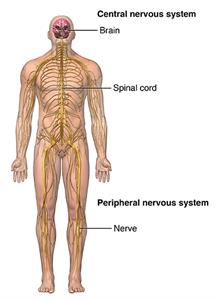Multiple Sclerosis (MS)
Overview
多发性硬化症(MS)是一种中枢神经系统的长期(慢性)疾病. 它被认为是一种自身免疫性疾病,是一种身体错误地攻击自己的情况. MS is an unpredictable disease that affects people differently. Some people with MS may have only mild symptoms. Others may lose their ability to see clearly, write, speak, 或者当大脑和身体其他部位之间的交流中断时,走路.

髓磷脂是一种包裹和保护神经纤维的蛋白质和脂肪物质. 在多发性硬化症中,免疫系统攻击髓磷脂,髓磷脂在许多地方被破坏. This loss of myelin forms scar tissue called sclerosis. These areas are also called plaques or lesions. When the nerves are damaged in this way, 它们不能正常地在大脑之间传导电脉冲.
当多发性硬化症引起反复发作时,它被称为复发缓解型多发性硬化症. 当症状随着时间的推移而没有明显的发作时,它被称为原发性进行性多发性硬化症.
What causes multiple sclerosis?
There are many possible causes of MS, such as:
-
Autoimmune disorders
-
Infectious agents, such as viruses
-
Environmental factors
-
Genetic factors
What are the symptoms of multiple sclerosis?
The symptoms of MS are often unpredictable. They may be mild or severe, short-term or long-lasting. 它们可能以不同的组合出现,这取决于受影响的神经系统区域. The following are the most common symptoms of MS. But each person may have different symptoms.
First symptoms of MS
-
Blurred or double vision
-
Red-green color distortion
-
视神经肿胀引起的疼痛和视力丧失(视神经炎)
-
Trouble walking and difficulty with balance
-
一种不正常的感觉,如麻木、刺痛或针刺(感觉异常)
Other symptoms of multiple sclerosis
-
Muscle weakness in the arms and legs
-
Trouble with coordination. You may have problems walking or standing. You may also be partly or completely paralyzed.
-
Spasticity. 这是不自觉的肌肉张力增加,导致僵硬和痉挛.
-
Fatigue. This may be brought on by physical activity. But it may ease with rest. You may have constant tiredness that doesn't go away.
-
Loss of feeling
-
Speech problems
-
Tremor
-
Dizziness
-
Hearing loss
-
Bowel and bladder problems
-
Depression
-
Changes in sexual function
大约一半的多发性硬化症患者有与该疾病相关的思维(认知)问题. The effects of these problems may be mild. Your healthcare provider may only find them after much testing. The problems may be with:
-
Focusing (concentration)
-
Attention
-
Memory
-
Poor judgment
MS的症状分为原发性、继发性或三期,如下所述:
|
Primary symptoms. 这些症状是髓磷脂破坏的直接结果:
|
Secondary symptoms. 这些是可能由于主要症状而出现的并发症,例如:
|
Tertiary symptoms. These are social, job-related, and psychological problems:
|
The symptoms of MS may look like other health problems. Always talk with your healthcare provider for a diagnosis.
How is multiple sclerosis diagnosed?
Not one specific test is used to diagnose MS. 诊断基于症状和体征、影像学检查和实验室检查. 医疗保健提供者可以通过遵循仔细的过程来排除其他原因和疾病来做出诊断. 要诊断为复发缓解型多发性硬化症必须具备以下两点:
-
You must have had 2 attacks at least 1 month apart. An attack is when any MS symptoms show up suddenly. Or when any MS symptoms get worse for at least 24 hours.
-
你的中枢神经系统一定有不止一个部位的髓磷脂受损. Myelin is the sheath that surrounds and protects nerve fibers. 这种损害必须发生在1个以上的时间点,而不是由任何其他疾病引起的.
你的医疗保健提供者会询问你的健康史,并做一个神经学检查. This includes:
-
Mental functions
-
Emotional functions
-
Language functions
-
Movement and coordination
-
Vision
-
Balance
-
Functions of the 5 senses
You may also need:
-
MRI. 这种诊断测试使用大型磁铁和计算机的组合,在不使用x射线的情况下,绘制出人体器官和结构的详细图像. It can find plaques or scarring caused by MS. Generally, 单次发作,再加上大脑MRI扫描显示的某些脑组织变化模式,就可能意味着你得了多发性硬化症.
-
Evoked potentials. 这些测试记录了大脑对视觉、听觉和感官刺激的电反应. 这些测试显示你大脑不同部位的信息传递是否减慢.
-
Cerebrospinal fluid analysis. This is also called a spinal tap or lumbar puncture. 它通过观察从脊柱中取出的液体来进行评估或诊断. 该测试检查MS所见的细胞和化学异常.
-
Blood tests. 这样做是为了排除各种神经症状的其他原因.
-
Eye exam and visual fields measurements.
How is multiple sclerosis treated?
Treatment will depend on your symptoms, age, and general health. It will also depend on how bad the condition is.
Currently, treatments are divided into:
-
Disease-modifying treatments. 这些药物直接针对中枢神经系统的炎症. They help slow its deterioration.
-
Treatment of acute relapses. 当你患有多发性硬化症时,使用类固醇和血浆交换(PLEX)可以加速你的恢复.
There is no known cure for MS. But you can do things to help change the course of the disease, treat flare-ups, manage symptoms, and improve your function and mobility.
Treatments for the conditions seen with MS may include:
-
药物(和你的医生谈谈,看看你可以选择什么药物)
-
Equipment, such as canes, braces, or walkers
-
Rehabilitation activities
Rehab varies depending on your symptoms and how bad they are. MS rehab may help you to:
-
Get back functions that are important for daily living
-
Be as independent as you can
-
Involve your family
-
Make the right decisions relating to your care
-
了解一些设备,比如拐杖、牙套或助行器,这些设备可以让你更容易走动
-
制定锻炼计划,增强肌肉力量、耐力和控制力
-
Get back motor skills
-
如果你的面部和舌头肌肉无力或不协调,说话要轻松一些
-
Manage bowel or bladder incontinence
-
Relearn thinking skills
-
改变你的家的设置方式,以保证你的安全,但允许你尽可能容易地移动
What are possible complications of multiple sclerosis?
The complications of MS range from mild to severe. They can range from fatigue to the inability to walk. 其他问题还包括视力丧失、平衡、排便或膀胱失控. 抑郁症可能是由于慢性疾病带来的生活困难造成的.
Living with multiple sclerosis
It's important to take your medicines as directed. You may get help by taking part in a clinical trial. 当走路变得困难时,使用手杖或助行器等设备可以帮助你四处走动. Rehab activities can also help you keep or get back functioning. 改变你的家的设置方式可以帮助你保持独立. 与你的家人和医疗保健提供者谈谈你需要什么.
Key points about multiple sclerosis
-
多发性硬化症(MS)是一种慢性中枢神经系统疾病.
-
MS is unpredictable. Some people may be only mildly affected. 其他人可能会失去看清楚、书写、说话或行走的能力.
-
早期症状包括视力问题、行走困难和刺痛感.
-
MS affects people differently. 但常见的问题是运动和思维障碍,以及肠道和膀胱失禁.
-
药物和康复可以帮助保持或恢复功能.

